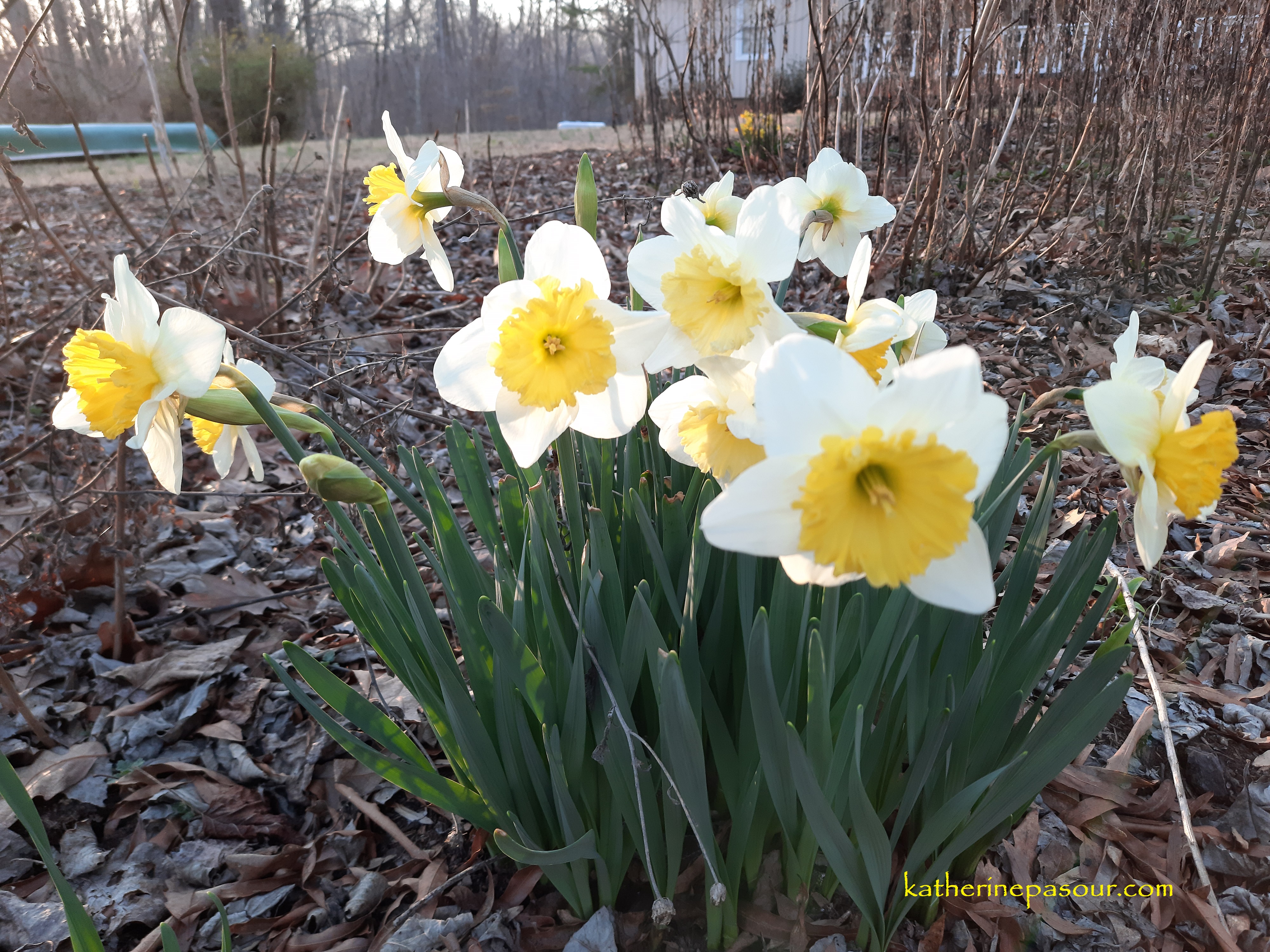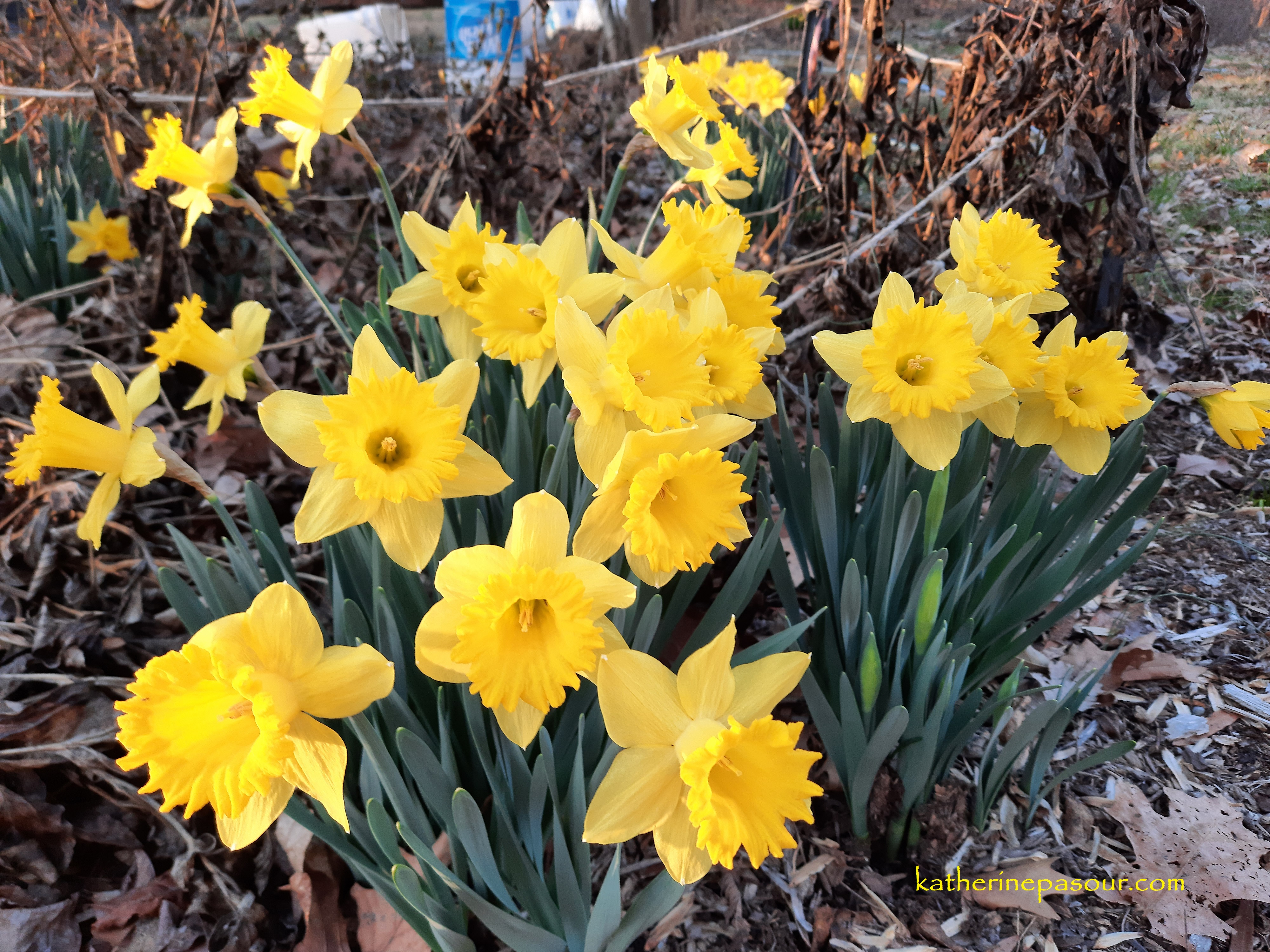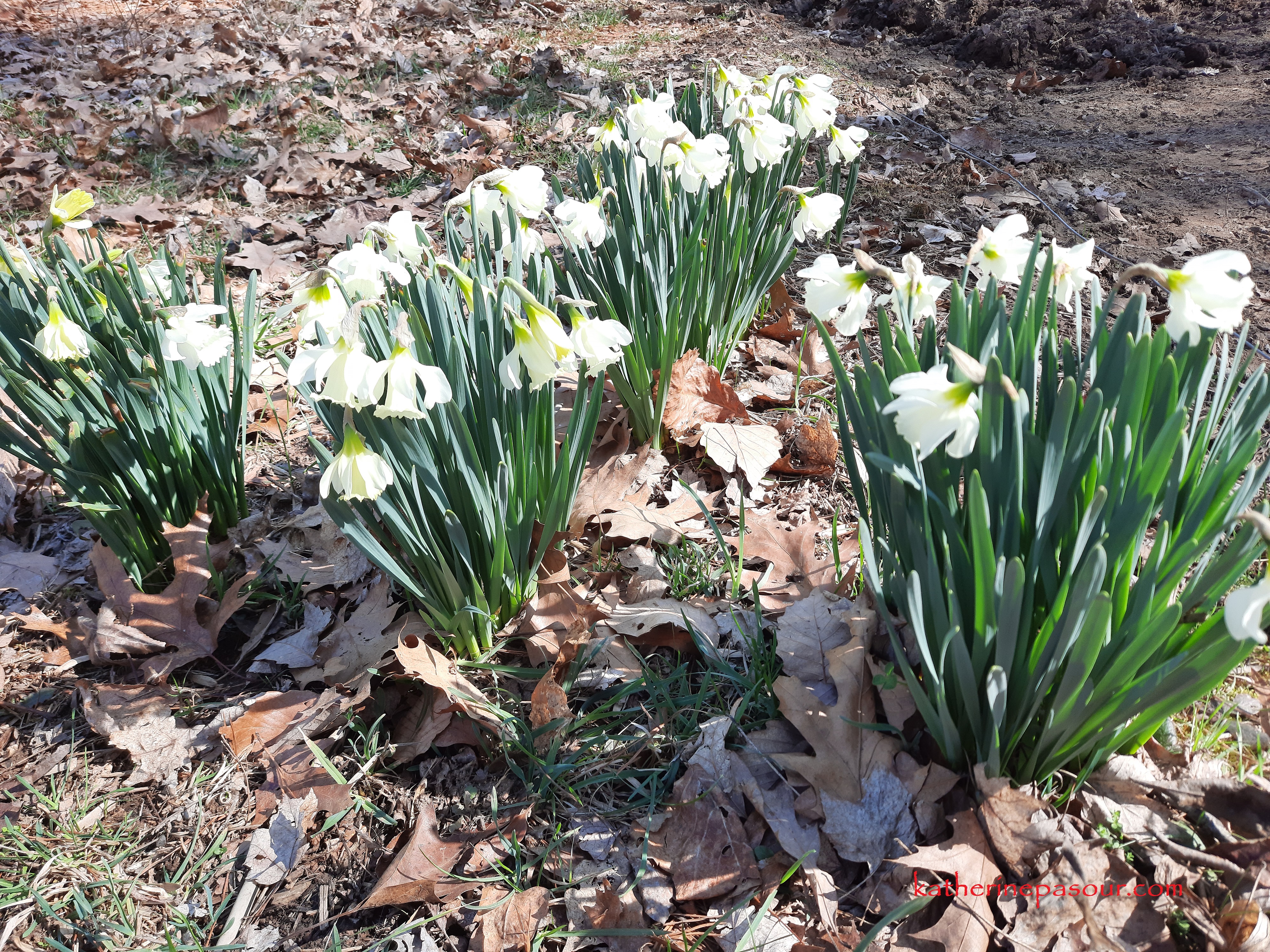Different, yet alike
As a child, my daughter had a book called, Different and Alike. I’m sure I still have the book somewhere, since I NEVER throw away books (although I do give them away at times).
The book, written on a child’s level, is designed to help children see there are both differences and similarities among people. Examples in the book included different physical traits, ethnicities, cultural beliefs, language, abilities, etc. Readers are encouraged to recognize that differences in children make us unique, while also seeing that we have much in common with others.

My buttercups (daffodils) are showing off their glorious beauty. These heralds of Spring point their sunny faces to the light as if to announce, “God made us beautiful and we’re sharing with you!”
Just as people have similarities and differences, so do flowers. The pictures I share today have large and small blossoms, the shades vary from sunny yellow to pale cream, and one variety mixes both colors. But they have much in common:
- They bloom where they are planted and cared for.
- It takes nurturing from others for the flowers to reach their fullest potential and show their glory.
- They are all part of the daffodil family, even though they differ in size of blooms, color, and when they display their blossoms.
- They all have unique beauty which they share freely with observers.

Of course, as adults, we recognize that each person is an individual, unique in their own way. The challenge in our society now seems to be a lack of ability or willingness to accept someone who has a different opinion than us on what we deem to be important standards, beliefs, and behaviors.
I’m not going to get into political philosophies here.
I’m focusing on the bigger picture–loving and respecting one another.
For Christians (and many other religions) our doctrines, guidelines, and teachings are clear in many areas:
- We are to love one another.
- We are to care for and respect our neighbor.
- We are to look after those less fortunate than us.
- We are to exhibit good moral character.
- We are to strive to achieve our fullest potential to be a contributing member of society.
So what lessons am I sharing from my lovely daffodils?
We are alike in some ways, but different in others, made by our Creator and shaped to be a unique and special person.
We are created with a variety of talents that our Father expects us to use in being the best person we can be, sharing our gifts with others, bringing beauty to the world around us through our service to God and others.
So, taking a lesson from my flowers, I hope and pray to recognize that others, although different from me in many ways, are alike in that we are all part of God’s creation, unique and “fearfully and wonderfully made” (Psalm 139:14). As such, I want to love and respect others. I hope you will join me!
Scripture reminds us:
Dear friends, let us love one another, for love comes from God. Everyone who loves has been born of God and knows God. (1 John 4:7 NIV)
There’s another action that can help us love others, especially those that aren’t very lovable (do you know anyone like that?) Or, like me, are you sometimes that unlovable person?
This clump of flowers, pictured below, reminded me of this action, this trait we sometimes lack. Can you guess?

Do you notice how these buttercups seem to look down? Instead of lifting proud, sunshiny faces to the sky, they shyly peer at the ground that nourishes their roots.
These different, but still lovely flowers, remind me of being humble.
Something that will help me in loving others, that are different from me, is to be less prideful and more humble.
Do nothing our of selfish ambition or vain conceit, but in humility consider others better than yourselves. (Philippians 2:3)
Jesus said, “Whoever humbles himself like this child is the greatest in the kingdom of heaven.” (Matthew 18:5)
The Lord takes delight in his people; he crowns the humble with salvation. (Psalm 149:4)
Why do you think it is so hard to be humble?
As we begin to experience the joyous restoration of Spring, I pray you will join me in striving to love others, even though they are different from us.

Katherine, the lessons you share from nature amaze me. I love the beautiful photos of your daffodils, and I hope to remember all the truths and verses you included in the post when I enjoy pretty spring flowers. Thank you!
Thank you for your encouragement, Jeannie. Being out in nature is such a blessing for me. My mind clears, my stress eases, and I feel so close to God. He blesses me when I’m on my nature walk or digging in the dirt of my flower beds. Wishing you a joyful and blessed week.
Katherine- love the way you developed the truths in this post. One word that has been brought to mind in recent weeks is “appreciation”. Though I may not “like” or choose something- I’ll take roses over marigolds- I can still appreciate the color, accent, and purpose they had to a garden.
I’m not a fan of marigolds either, Marilyn, but they do add glorious color. And if their smell really keeps away insects and pests, then they are certainly contributing a service. Reminds me that I should focus on the best qualities of a situation (or people) and avoid zoning in on the negative. I’ve certainly been given grace in that area many times. Thank you for sharing you insight. I love the way you point out the difference between “like” and “appreciate.” Helps us to appreciate our blessings, even if they aren’t always what we asked for.
Katherine, this post is beautiful in both words and photos! Your buttercups are lovely! Humility is a trait often viewed as weakness, but in my opinion, is a most beautiful trait. May my face look down to see where my nourishment comes from; and upwards to see where my help comes from. 🙂
Joanne, my lack of humility in certain situations has gotten me in trouble many times. Thankfully, my prayers were answered and God has fostered improvement in that area–less pride and more humility. But I’m still a work in progress! Thankful for His grace and mercy. Thank you for sharing your thoughts.
I’m continually amazed at the way creation always holds a picture for us of spiritual truths. For me, it enhances the beauty because it takes it to a much deeper level than just what we see.
Thank you for sharing these valuable insights. I’ll don’t think I’ll ever look at the daffodils in the same way.
I’m grateful for your encouragement, Terri. We are so blessed by God’s creation and His willingness to share it with us. He sends us so many lessons through nature, and as you point out–spiritual truths. Thank you for blessing us today by sharing this thought–creation and God’s spiritual truth “enhance the beauty because it takes it to a much deeper level than just what we see.” I love that! It is why my walks in nature bring me such peace, comfort, and truth. Our Father sends “more than we see.”
I moved from my former house last fall, and I’ve sorely missed the daffodils that grew there. Thanks for these glorious photos and the message.
If we focused on our likenesses with others rather than our differences, what a better place the world could be. Then maybe we could better appreciate our differences.
I agree, Candyce. When we focus on our differences, conflicts will usually arise. The turmoil we are experiencing both here and abroad shows the catastrophic results which occur when we are unable to respect differences or strive to love one another in spite of our different cultures and views.
A beautiful post about beautiful lowers and the lessons we can learn from them about how we treat others and bring the beauty of God into the world through our actions and word. I like those humble daffodils as well as the other gorgeous ones looking up the God! May we each strive to be like them both !
It’s been a struggle for me to learn to actively strive to live with humility. But my family and friends can attest to the fact that I’m doing better. Of course, there is always room for improvement. I’m so thankful God provides loving instruction AND gives us many more chances when we mess up. I’m praying that world leaders will begin to discover that humility is not a weakness, but a strength (as we learned from Jesus). Thank you for your encouragement, Kathy.
I think our Creator God delights in our differences but is pained at the way we exalt one trait as more superior to the other, when we are all valuable in His eyes BECAUSE of our differences. The drooping flowers in the bunch is a powerful visual for sure! Beautiful teaching, Katherine!
I love the way you expressed your thoughts about our Father’s disappointment in us when we view ourselves as superior to others. It can happen to anyone and sometimes sneaks up on us. But in a more horrific form, on our world stage today, we see the tragic results of one person’s view that he is superior and has the right to decide the destiny of another country. I hope we all continue to pray for peaceful reconciliation. So much pain could be avoided if we all loved one another.
Well said and timely. Thank you.
Thank you for your kind encouragement, Diana. May God continue to bless your ministry of service to Him.
Amen! Well said Ms. Katherine. Something I’ve often considered is that we send little children (pre-schoolers) of every race, creed, or color and they get along famously with one another. With the exception a spoiled child here or there that hasn’t learned to share, these little folks laugh, explore, eat, and share life together. Yet, as they age, we see the “dividing lines” being made. My belief (doesn’t mean I’m right, but allows for others to disagree) is that DIVISION is a taught trait. If they played together before they learned (from someone or some thing they observed) that they shouldn’t, then someone had to bring that change about. That, for me, is the truly sad part as I wonder in my life how many littles saw that in me. I pray these days, I can be a better example for the next generations. Great analogy ma’am. God’s blessings.
I join you in prayer, my friend, that we can all be a better example for future generations. We can certain see what horrific harm hate and division cause in our world. Just as our children learn division and prejudice because they are taught, they will also absorb that love can be shared (in fact, as you point out, they do that by instinct until we teach them not to). I believe we each have a part in spreading love, compassion, and tolerance throughout our own little world. That ripple effect will continue to spread far beyond our ability to even imagine. When Jesus commanded us to love one another as He loves us, He meant it. We can all do our part to spread our Savior’s love.
I like to see us a God’s bouquet. We are all flowers in His garden, but all different which makes that bouquet beautiful. Thanks for sharing your gorgeous daffodils, Katherine.
Different but beautiful–love that, Barbara. I love flowers and I’m so grateful for the opportunity to share their beauty. Thank you for the blessing you shared with me today.
I love when we open our eyes (and hearts) to let the simplest things in nature teach us about ourselves and our faith. Daffodils are some of my favorites so now I’ll think “different but still beautiful” when I see them this spring.
I learn so much from my walks in nature and my life on the farm. Sometimes I’m slow to get the lesson, but I’m thankful God is patient with me. He not only gifted us with His beautiful creation, He sends us wonderful lessons and He sends another one if we miss the first! I’m thankful for second chances. Wishing you continued blessings, Leigh.
I love the metaphor of the buttercups! Wonderful!
Thank you, Nancy. I’m grateful God uses nature to send me lessons. Wishing you a blessed week!
Beautiful message. Thank you for sharing with us.
So wonderful for you to stop by, Esther. Do you love flowers, too? Nature grants me such peace and blessing as God shares the gift of his majestic creation with us.
Katherine, my daffodils have not yet bloomed, but I will be reminded once again of these lessons. Thank you also for the reminder from the buttercups. I’m always in need of that one.
Thank you, Annie. My buttercups are very sad now–the recent storm beat them down to the ground. But like us, after trials, God will lift them up and be with them through the coming days as they bloom again and then take their rest until next year. Wishing you a blessed week!
I am visiting family in Wales right now and the daffodils are in full bloom. Such a beautiful site. Your post had perfect timing.
Thank you, Jen. I hope you’re having a wonderful trip! I’ve enjoyed seeing your pictures. Praying for safe travels.